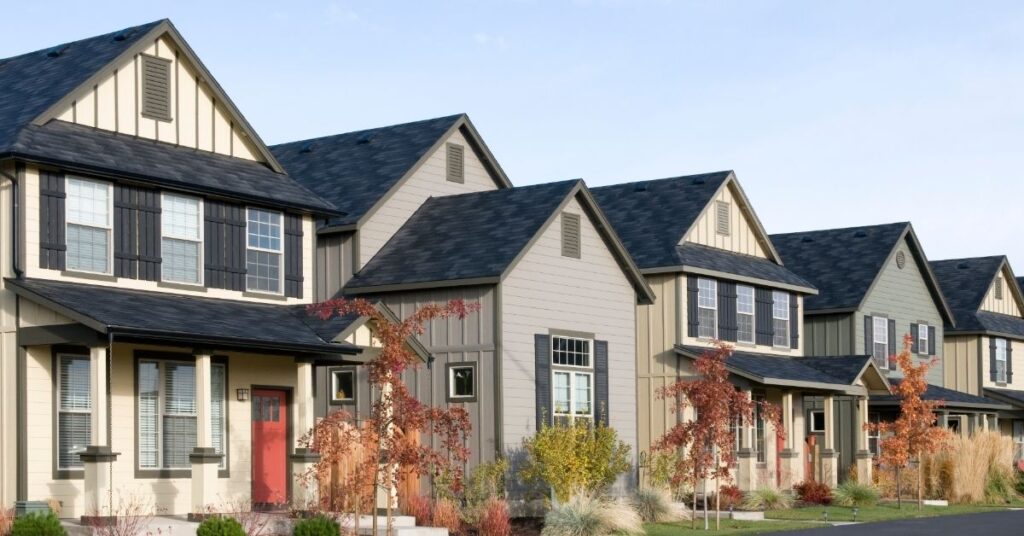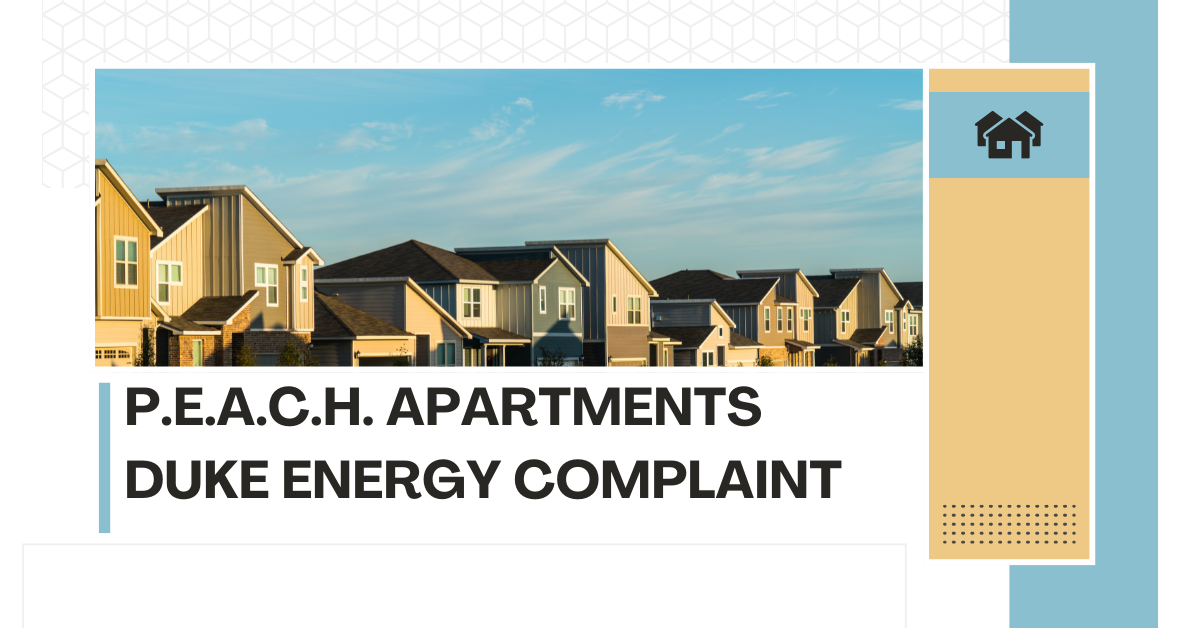Introduction
In the heart of Chapel Hill, a newly built affordable housing project known as P.E.A.C.H. Apartments has become the focus of a heated debate — centered on the p.e.a.c.h. apartments duke energy complaint over metering and service denial. Many expected that the power would be turned on seamlessly, but complications over Duke Energy’s metering rules meant otherwise. The nonprofit developer, EMPOWERment Inc., filed a formal complaint with the North Carolina Utilities Commission, demanding immediate resolution.
p.e.a.c.h. apartments duke energy complaint: Why It Matters
The p.e.a.c.h. apartments duke energy complaint highlights a growing tension between utility regulations, affordable housing models, and clean energy integration. P.E.A.C.H. (Pine Knoll EMPOWERment Affordable Community Housing) was designed to serve residents with very low incomes, with the goal of reducing both rent and utility costs.
The building design included rooftop solar and a single master meter setup — meaning electricity costs would be included in tenants’ rent. Duke Energy, however, denied power service for that design, citing rules that require individual meters for each unit.
This case is about more than wiring — it’s about how modern energy policy can support or obstruct equitable housing access.

p.e.a.c.h. apartments duke energy complaint: Background and Timeline
In early spring, P.E.A.C.H. Apartments officially opened for occupancy, but Duke Energy refused to provide permanent power due to the single-meter design. The nonprofit argued that individual meters would undermine affordability and prevent rooftop solar integration.
After negotiations failed, EMPOWERment Inc., represented by the Southern Environmental Law Center, filed a formal complaint with the North Carolina Utilities Commission. The complaint requested two things: immediate service connection and a ruling confirming the project’s design was lawful under North Carolina law.
Eventually, Duke provided a temporary meter to prevent damage to the property, and later reconnected full power while awaiting a legal decision. However, the larger regulatory debate remains unresolved.
p.e.a.c.h. apartments duke energy complaint: Key Legal & Regulatory Issues
Metering Rules and Exceptions
North Carolina’s building and energy codes generally prohibit new residential buildings from using master meters for multiple units. Yet, the law includes an exception: if utilities are included in the lease, the master meter model may be permitted.
Duke Energy maintains that each dwelling unit must have its own meter to ensure accurate billing and compliance with state rules. The nonprofit, however, argues that their lease explicitly includes utilities in rent, fulfilling the exception’s requirement.
Solar Integration and Single Meter Model
The P.E.A.C.H. Apartments’ solar-plus-master-meter model was designed to cut costs and make clean energy accessible to low-income residents. The single-meter setup simplifies how solar power offsets energy consumption across the building.
Duke’s position is rooted in regulations preventing resale or redistribution of electricity, even though this project does not profit from such distribution. This grey area lies at the core of the complaint.

Cost and Delay Impacts
Rewiring the building for individual meters could cost tens of thousands of dollars and delay tenant move-ins for several months. The delay also threatens funding compliance and risks damage to vacant units from humidity and inactivity.
For tenants waiting to move in, these setbacks are not just technical—they’re deeply personal, affecting livelihoods and housing security.
p.e.a.c.h. apartments duke energy complaint: Stakeholders and Entities
This dispute involves several major stakeholders:
- EMPOWERment Inc., the nonprofit housing developer advocating for equitable energy inclusion.
- Duke Energy Progress, the power provider enforcing state metering regulations.
- Southern Environmental Law Center, representing EMPOWERment in the legal process.
- North Carolina Utilities Commission, the body responsible for resolving the complaint.
- Potential residents, who continue waiting for access to affordable, solar-powered homes.
- Local officials and housing advocates, who see this case as a precedent for future projects.
p.e.a.c.h. apartments duke energy complaint: Personal Insight
In a similar housing project I once observed, a developer attempted to include utilities within rent under a master meter. The utility rejected the setup, forcing costly rewiring. That experience mirrors this case — revealing how older regulations can clash with today’s affordable and sustainable housing goals.
The main takeaway from both experiences: when innovation meets bureaucracy, foresight and dialogue are everything. Early collaboration with utility providers is crucial before finalizing system designs.
p.e.a.c.h. apartments duke energy complaint: Current Status and Next Steps
As of mid-year, power at P.E.A.C.H. Apartments has been restored through a temporary arrangement, allowing basic maintenance and protection of the property. The Utilities Commission is reviewing EMPOWERment’s formal complaint and will determine whether the project’s single-meter design qualifies for a permanent exception.
If the Commission rules in favor of EMPOWERment, it could set a statewide precedent—empowering other affordable housing developers to integrate solar energy and simplified billing models.
p.e.a.c.h. apartments duke energy complaint: Why This Sets a Precedent
This complaint could reshape how affordable housing and renewable energy coexist. It challenges traditional assumptions about metering and who should control access to power.
Possible outcomes include:
- Clarifying that master meters with inclusive rent are legally valid.
- Encouraging utilities to modernize rules for solar-enabled housing.
- Setting the foundation for cleaner, more affordable power access for vulnerable populations.
p.e.a.c.h. apartments duke energy complaint: Lessons for Developers and Advocates
Developers considering similar projects can learn from the P.E.A.C.H. experience:
- Engage utilities early. Always confirm the metering policy before construction begins.
- Document lease inclusivity. Clearly state that utilities are covered in rent.
- Consider long-term maintenance. Master meter setups may require additional safety measures.
- Seek regulatory support. Involve local energy and housing advocates to strengthen your case.
p.e.a.c.h. apartments duke energy complaint: Broader Implications
This issue reflects a nationwide debate over how legacy energy systems adapt to equitable and sustainable housing. As clean energy becomes essential, regulatory frameworks must evolve to support innovation rather than block it.
For Duke Energy, the challenge lies in balancing policy compliance with community needs. For nonprofits like EMPOWERment, the goal remains ensuring housing that is both livable and future-ready.
p.e.a.c.h. apartments duke energy complaint: Environmental and Social Impact
The P.E.A.C.H. project was envisioned as a model of sustainability — solar power, efficient appliances, and inclusive rent. The delay not only impacts tenants but also stalls a symbolic shift toward renewable-powered low-income housing.
This conflict illustrates how rigid policies can unintentionally hinder climate progress, even when projects align with state and federal sustainability goals.

p.e.a.c.h. apartments duke energy complaint: Moving Toward Resolution
Regardless of the ruling, this case has already sparked valuable discussions in North Carolina’s energy and housing sectors. Legislators, regulators, and utilities are now reassessing how policies can accommodate affordable housing innovation without compromising accountability or service integrity.
A collaborative solution — such as conditional service approval or pilot exemptions for nonprofit housing — could pave the way for smoother future partnerships.
p.e.a.c.h. apartments duke energy complaint: Conclusion
The p.e.a.c.h. apartments duke energy complaint stands as a call for fairness, progress, and modernized regulation. It asks one key question: how can we make essential services both affordable and sustainable for those who need them most?
P.E.A.C.H. Apartments were built with a mission to empower low-income families, not to be caught in bureaucratic limbo. As the Utilities Commission reviews the case, its outcome will likely shape the future of affordable housing, renewable energy, and equitable access across the state.
FAQs
Q1: What is the p.e.a.c.h. apartments duke energy complaint about?
It’s a legal dispute in which Duke Energy initially refused to provide power to P.E.A.C.H. Apartments because the building used one master meter instead of individual unit meters.
Q2: Why did Duke Energy deny service?
The company cited service regulations that require each apartment unit to have its own meter, arguing that single meters do not comply with current rules.
Q3: Why did EMPOWERment choose a master meter?
To include utilities in rent and to integrate solar energy savings directly for all residents without complex redistribution.
Q4: What are the possible outcomes?
The Utilities Commission could side with EMPOWERment, allowing master metering, or uphold Duke’s interpretation, forcing rewiring and delays.
Q5: Why does this case matter beyond Chapel Hill?
Its ruling could set precedent for how utilities treat similar affordable housing projects that combine solar energy and master-meter billing.


